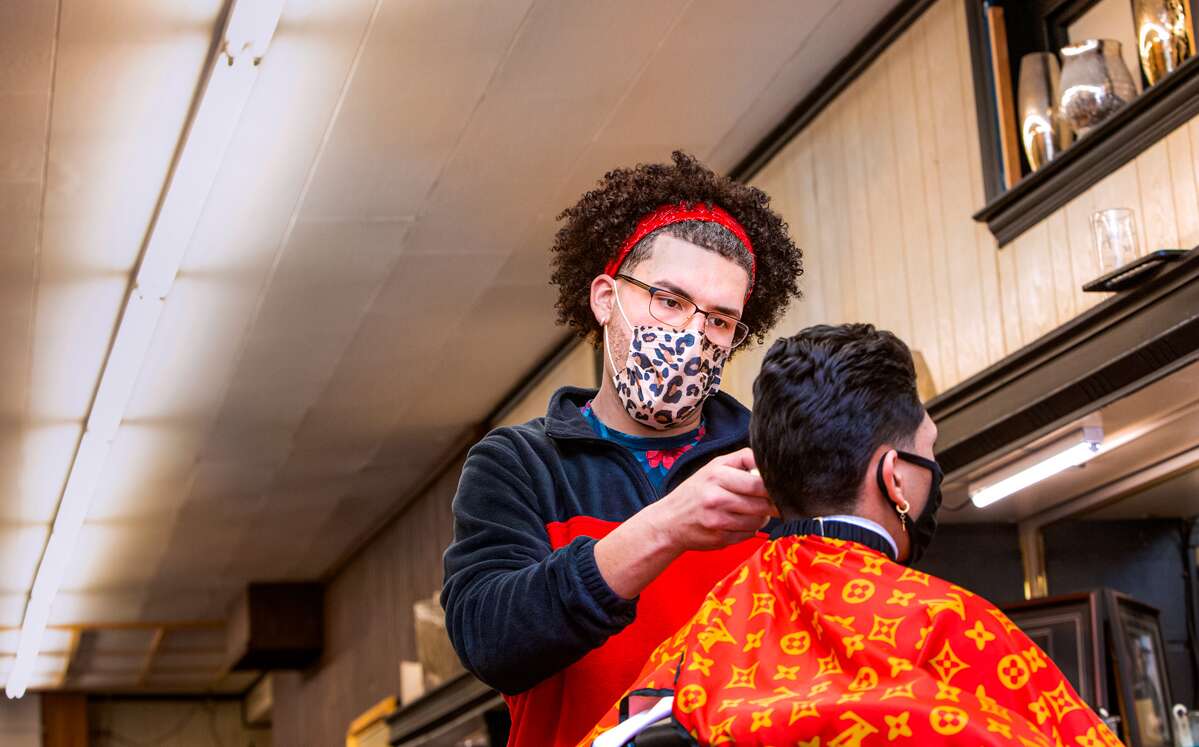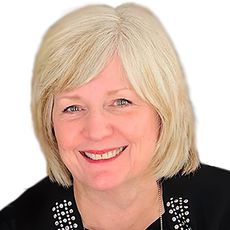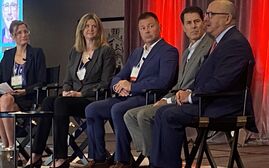
Grassroots efforts: For small businesses, diversity and inclusion revealed in everyday actions
 Photo / Tim Greenway
Adrian Reyes, owner of the Kings and Queens Hair Studio in Brunswick, wanted to create an atmosphere where people of any background or gender would feel comfortable.
Photo / Tim Greenway
Adrian Reyes, owner of the Kings and Queens Hair Studio in Brunswick, wanted to create an atmosphere where people of any background or gender would feel comfortable.
When Adrian Reyes opened his barber shop, Kings and Queens Hair Studio, in Brunswick five years ago, he wanted to create an environment where people of any background and gender would feel comfortable.
“I envisioned a place where a husband and wife, girlfriend and boyfriend, aunt and nephew could come and feel at home and get their hair done. Women don’t typically go to barber shops, but we want them to feel at home,” Reyes says.
He’s grown the barber shop to eight stylists, all through word of mouth.
“When I opened up the shop, I realized there was a lot more of me out there,” Reyes says. “I don’t even put out ads or anything. They just gravitate towards the shops. Felons, guys that got looked down on, people who felt they didn’t belong, somehow gravitate towards me. With the right mentor, people can really excel and really be inspired and grow.”
He’s already sparked growth, with six former workers starting their own shops, he says.
People come as far away as Portsmouth, N.H., and Rockland to his Brunswick shop, which is on Maine Street. Reyes wanted to create a “family-friendly, multi-ethnic, multi-generational” shop, he says.
Reyes is proud of the mix of clientele and workers.
“We have a Salvadorian. A Jamaican. An Italian. Two Irish. We’re all over the map,” Reyes says.
Reyes aims to open a hair academy in the next year to teach hair styling. He wants to locate the school north of Brunswick to draw customers from other towns where multi-ethnic services are hard to find.
“I want to create my own Portland,” Reyes says.
Reyes admits it was hard being a Puerto Rican who moved to Maine in high school when he didn’t speak English and his school lacked classes in English as a Second Language.
“There’s no diversity in Maine. No ESL. It’s really hard and you need a thick skin,” Reyes says.
Kings and Queens grew much the way many small businesses do — through word of mouth and some grit, experts say.

A state lacking in diversity
Small businesses in Maine employed 56.9% of the state’s private workforce in 2018, according to the U.S. Small Business Administration. In a state that’s more than 90% white, however, it makes it more complicated for small businesses to diversify.

“When you’re a small business, you’re running a business, you’re chief cook and bottle washer and you don’t have time. How do you diversify your workforce when you look at the demographics of the state? Given the size of the labor pool, you’re competing with large companies. Small companies will never be as diverse as a WEX-type company,” says Saïd Eastman, CEO of JobsInTheUS, which operates JobsInME.
“The lack of transportation in the state is a problem. There’s diverse populations in Lewiston, but how do you get that population spread throughout workplaces in the state without transportation?” Eastman says.
In addition to the transportation problem, language barriers and weak wages compared with neighboring states all make it harder for businesses in Maine to attract diversity, Eastman says.
As a result, Maine businesses need to expand their definition of diversity and become more creative in hiring to create a mix of employees, experts say. Veterans, disabled adults or women in traditionally male jobs are all ways to bring new ideas and new energy into a workforce.
Dan Miller, a lobsterman in Tenants Harbor, has hired many women as sternmen over the years. While female sternmen aren’t the norm, Miller says they often bring qualities that men may lack.
“Most women aren’t as strong as men but they have better manual dexterity and are really, really fast at picking lobster out of the traps. They may not be as good at throwing traps around the boat, but they have speed,” Miller says.
The female sternmen tend to seek him out, with word of mouth spreading that he will hire women. Hiring a woman for a traditionally male job doesn’t bother him, he says.
“Lobstermen are having a hard time finding sternmen now so anyone who is willing to come to work on time and do the job — they’re fine by me,” Miller says.
Small businesses need to think of everything they do as recruiting and looking for talent, whether it’s other business partnerships, where you shop, the Rotary Club or even being a coach on a community baseball team — all of these are opportunities to meet new people, make connections and find new employees, says Mandy Levine, a human resources and recruiting specialist of Mandy Levine Consulting.
“A lot of activities employers do aren’t formally defined as networking and recruiting. But we’re a small state with a small population. We encourage employers to maintain connections. Hold informational interviews, internships or mentorship opportunities,” Levine says.
Levine recommends businesses contact high schools, local community colleges and universities, and adult education centers to find a mix of employees.
“These education centers would love to hear about jobs that are hiring and welcoming,” Levine says.

“Some businesses say ‘diverse people don’t apply.’ But you can work with recruiters to mix the applicant pool,” says Rhoda McVeigh, director of consulting services, KMA Human Resources LLC.
Even if you can’t recruit a diverse mix of employees, Rose Barboza, founder and co-director of online business directory Black Owned Maine, suggests diversifying the vendors and philanthropic organizations that companies support.
“There are certain places in Maine where you can’t have a diverse workforce. But you could buy from a black farm or black owned vendor,” Barboza says.
Rebecca Emmons, executive director of Mobius Inc., based in Damariscotta, which works with people with intellectual and developmental disabilities, believes businesses are willing to diversify, but it requires some thoughtful and deliberate effort.
“We are very lucky to live in a geographic region very open to working with people with disabilities and differences. The willingness is there. Some companies just need to know how to go about it,” Emmons says.
Before the pandemic, Mobius had a lot of clients placed in food service work, but that has been hurt by COVID-19 restrictions. Mobius also has long-term partnerships with local lumber yards, as well as Hannaford, where clients clear and stock shelves, and Bigelow Laboratory in East Boothbay, where clients clean and do maintenance.
“Social justice of inclusion is important for all types of workers. How do we help and have a broader workforce everywhere? There’s always work to be done,” Emmons says.
Even if there’s work to be done, the work is important, Barboza says.
“It’s about being explicit that you’re an antiracist company. What side of history are you on? If you don’t have a black person or person of color on staff, have the tools and openness ready when someone does apply,“ Barboza says.














0 Comments